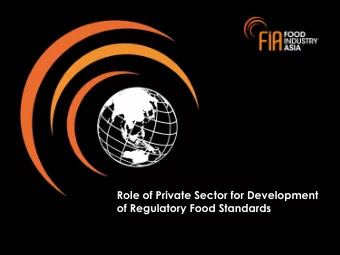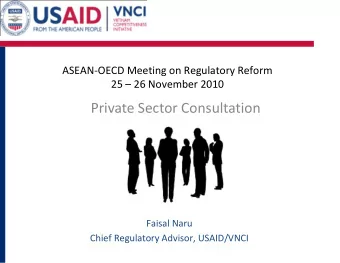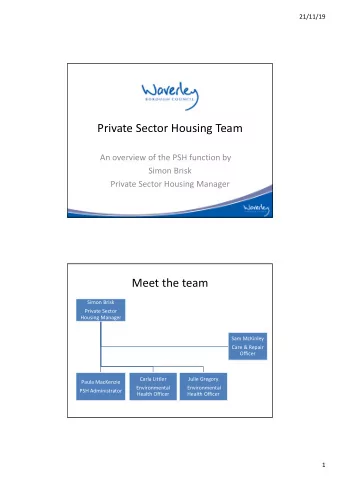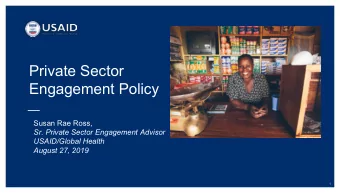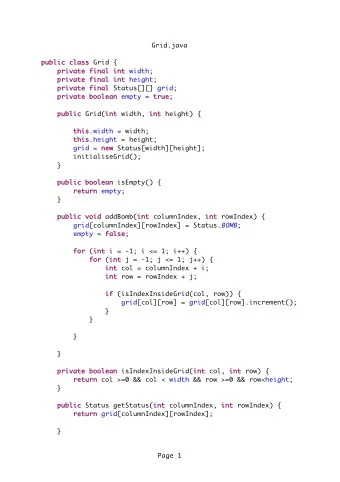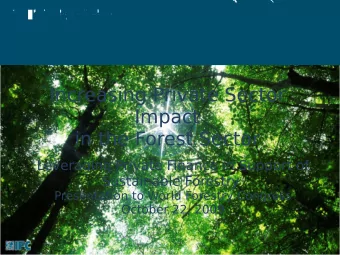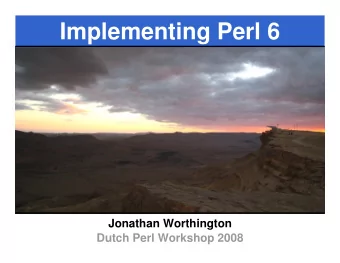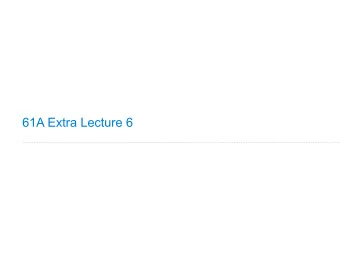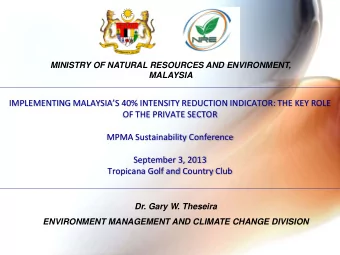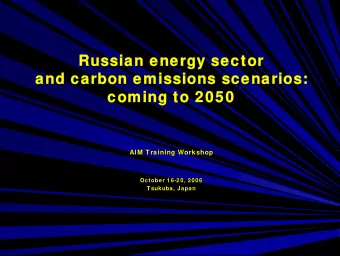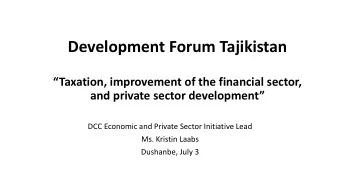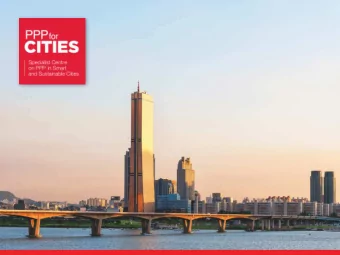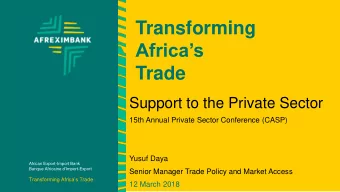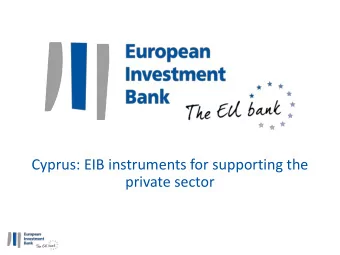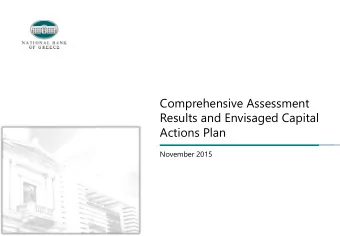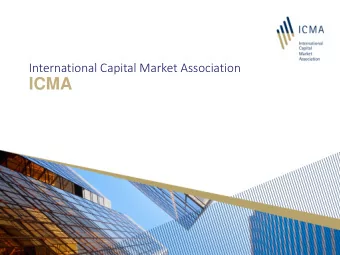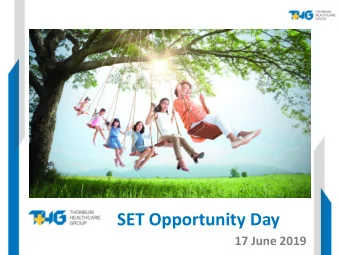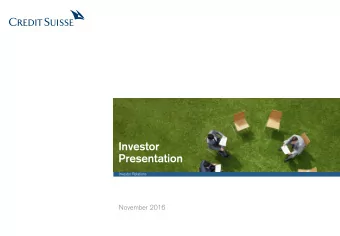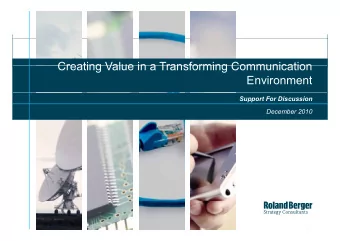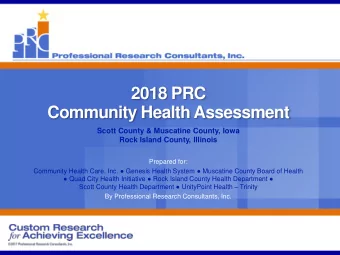
The Role of Private Sector in Implementing Sustainable Development - PowerPoint PPT Presentation
1 The Role of Private Sector in Implementing Sustainable Development Goals (SDGs) in Bangladesh Asif Ibrahim Vice-Chairman, Newage Group Dhaka: 2 October 2016 Organised by 2 The 17 Sustainable Development Goals Source: United Nations 3
1 The Role of Private Sector in Implementing Sustainable Development Goals (SDGs) in Bangladesh Asif Ibrahim Vice-Chairman, Newage Group Dhaka: 2 October 2016 Organised by
2 The 17 Sustainable Development Goals Source: United Nations
3 Introduction and Outline of the Presentation • Through 2030 Agenda for Sustainable Development, the World is going to embrace a Transformative Journey , in which Private sector is one of the main partners. • SDG 12 (Sustainable consumption and production) and some cross-cutting targets of SDG 8 and SDG 9 have given specific importance to the Private Sector‟s role. • The major areas focused here are- ▫ Transformation of MDGs to SDGs ▫ Role of private sector ▫ Situation analysis of SDG 12 targets and 7 th 5YP targets ▫ Private Sector and its role in implementing SDGs with special emphasis of 12, 8 and 9 ▫ Existing policies and projects related to SDGs ▫ Resources and Challenges ▫ Some Food for Thoughts
4 Success of MDGs & Birth of SDGs • The MDGs were established following the Millennium Summit of the United Nations in 2000 which consisted 8 goals, 20 targets and 60 indicators. • Bangladesh met several targets of the MDGs like reducing headcount poverty and poverty gap ratio, reducing the prevalence of underweight children, attaining gender parity at primary and secondary education, under-five mortality rate reduction, containing HIV infection with access to antiretroviral drugs etc. • The incidence of poverty had declined on an average 1.74 percentage points in Bangladesh during 2000 to 2010 against the MDG target of 1.20 percentage points. • Based on MDGs, SDGs were launched with much broader coverage Source: Millennium Development Goals: Bangladesh Progress Report 2015
5 SDGs and Engagement of private Sector- Rio+20 (Earth Summit 2012) • The Rio+20 -the third international conference on sustainable development in 2012 brought a change in the thinking about the role of the private sector in sustainable development. • The SDGs have come to represent a great opportunity for the development community to engage strategically with the private sector . (The United Nations Private Sector Forum 2015). • SDGs, adopted a set of goals to end poverty, protect the planet, and ensure prosperity for all as part of a new sustainable development agenda, officially known as „Transforming our world: the 2030 Agenda for Sustainable Development‟ spans 193 UN Member States, announced on Sept 25, 2015. • The SDGs reflect an ambitious development objective with a transformative vision. The SDGs framework, unlike the MDGs, has been formulated to be universal and applicable to all countries. • Each goal has specific targets to be achieved over the next 14 years. These are an intergovernmental set of goals with 169 targets.
6 SDG- 12- RESPONSIBLE CONSUMPTION & PRODUCTION • Sustainable consumption and production is about promoting resource and energy efficiency , sustainable infrastructure , and providing access to basic services, green and decent jobs and a better quality of life for all. • Achieving economic growth and sustainable development requires that we urgently reduce our ecological footprint by changing the way we produce and consume goods and resources. • The efficient management of our shared natural resources , and the way we dispose of toxic waste and pollutants , are important targets to achieve this goal. • All these highlighted points have increased responsibilities of the private sector many fold to be more responsible for the use resources available in the earth. • Government is in the process of preparing a Strategy aligning national policies with the SDGs
7 Comparison of SDG12 Goals with 7 th 5YP 7 th FYP Targets SDG 12 Targets 12.1 Implement the 10-year framework of Not Addressed. Developed Countries need to be programs on sustainable consumption and made responsible production , all countries taking action, with developed countries taking the lead, taking into account the development and capabilities of developing countries 12.2 By 2030, achieve the sustainable Capacity development on resource accounting and management and efficient use of natural natural resource management resources 12.3 By 2030, halve per capita global food waste Not Addressed at the retail and consumer levels and reduce food losses along production and supply chains, including post-harvest losses 12.4 By 2020, achieve the environmentally Encourage different hazard based contingency sound management of chemicals and all wastes planning like chemical and technological hazards, throughout their life cycle, in accordance with road and water safety, nuclear and radiological agreed international frameworks , and risk, biological hazards, landslide significantly reduce their release to air, water and soil in order to minimize their adverse impacts on human health and the environment
8 Comparison of SDG12 Goals with 7 th 5YP 7 th FYP Targets SDG 12 Targets 12.5 By 2030, substantially reduce waste Design and implement plans on solid waste generation through prevention, reduction, management in accordance with the 4R policy recycling and reuse (reduce, reuse, recycle, reclaim) 12.6 Encourage companies, especially large and Private Sector would need to be engaged transnational companies, to adopt sustainable practices and to integrate sustainability information into their reporting cycle 12.7 Promote public procurement practices that Public Procurement Policies are in the process of are sustainable, in accordance with national updating. Private sector can be engaged for policies and priorities revisiting the policy 12.8 By 2030, ensure that people everywhere have Should be included in the strategy the relevant information and awareness for sustainable development and lifestyles in harmony with nature 12.8.a Support developing countries to Supportive projects would need to be initiated. strengthen their scientific and technological Private sector need special support in this respect. capacity to move towards more sustainable SDGs would need special attention for patterns of consumption and production environmental, economic, legal, social, technological, political and ethical practices development.
9 Comparison of SDG12 Goals with 7 th 5YP 7 th FYP Targets SDG 12 Targets 12.8.b Develop and implement tools to monitor Eco-tourism promoted at least in 20 protected sustainable development impacts for sustainable areas and ECAs tourism that creates jobs and promotes local culture and products 12.8.c Rationalize inefficient fossil-fuel subsidies Primary energy subsidy will be capped at around that encourage wasteful consumption by 1% of GDP removing market distortions , in accordance with national circumstances, including by restructuring taxation and phasing out those harmful subsidies, where they exist, to reflect their environmental impacts, taking fully into account the specific needs and conditions of developing countries and minimizing the possible adverse impacts on their development in a manner that protects the poor and the affected communities Source: Govt. Policies, CPD, BUILD
10 Comparison of SDG12 Goals with 7 th 5YP Partially Fully overlapped with core 7th FYP overlapped with core 7th FYP targets, 3.0 targets, 9.5 Equivalent to core 7th FYP No target, 20.7% targets, 7.1 Not applicable for Bangladesh, 22.5% Other sectorial targets, 37.3 % • The 12.5 and 12.c targets of SDG 12 are partially overlapped with the 7 th FYP targets. • The 12.2, 12.4 and 12.b targets of SDG 12 are equivalent to the 7 th FYP targets • National Sustainable Development Strategy 2010-21 is the sectorial policy for achieving SDG 12. Source: Center for Policy Dialogue (CPD)
11 Rank of Bangladesh Related to SDG12 • In the SDG Index & Dashboard used by UN Sustainable Development Solutions Network (UNSDN), Bangladesh was ranked o 13 among 136 countries on Municipal solid waste (MSW) o 124 among 149 countries on Waste water treated (WASTEWAT) SDG12_MSW SDG12_WASTEWAT 160 160 140 Number of Countries 140 Number of Countries 120 120 100 100 80 80 60 60 40 40 20 20 0 Observed Rank of 0 Observed Rank of countries Bangladesh countries Bangladesh SDG12_WASTE 149 124 SDG12_MSW WAT 136 13 Source: SDG Index & Dashboard
12 SDGs 8: Promote Sustain, Inclusive and Sustainable Eco Growth, Full & productive Employment and Decent Work for all(Ten Goals) • Sustain per capita income(7% for the LDCs), end Child Labour by 2025, protect labour rights • Sustenance of per capita economic growth and Productivity through Diversification • Technological upgrading and Innovation • High Value added and labour intensive sectors • Growth of Micro and SME through access to Finance. Strengthen the capacity of the domestic Financial Institutions. • Improve global resource efficiency in consumption and production progressively • Education and Training
Recommend
More recommend
Explore More Topics
Stay informed with curated content and fresh updates.
